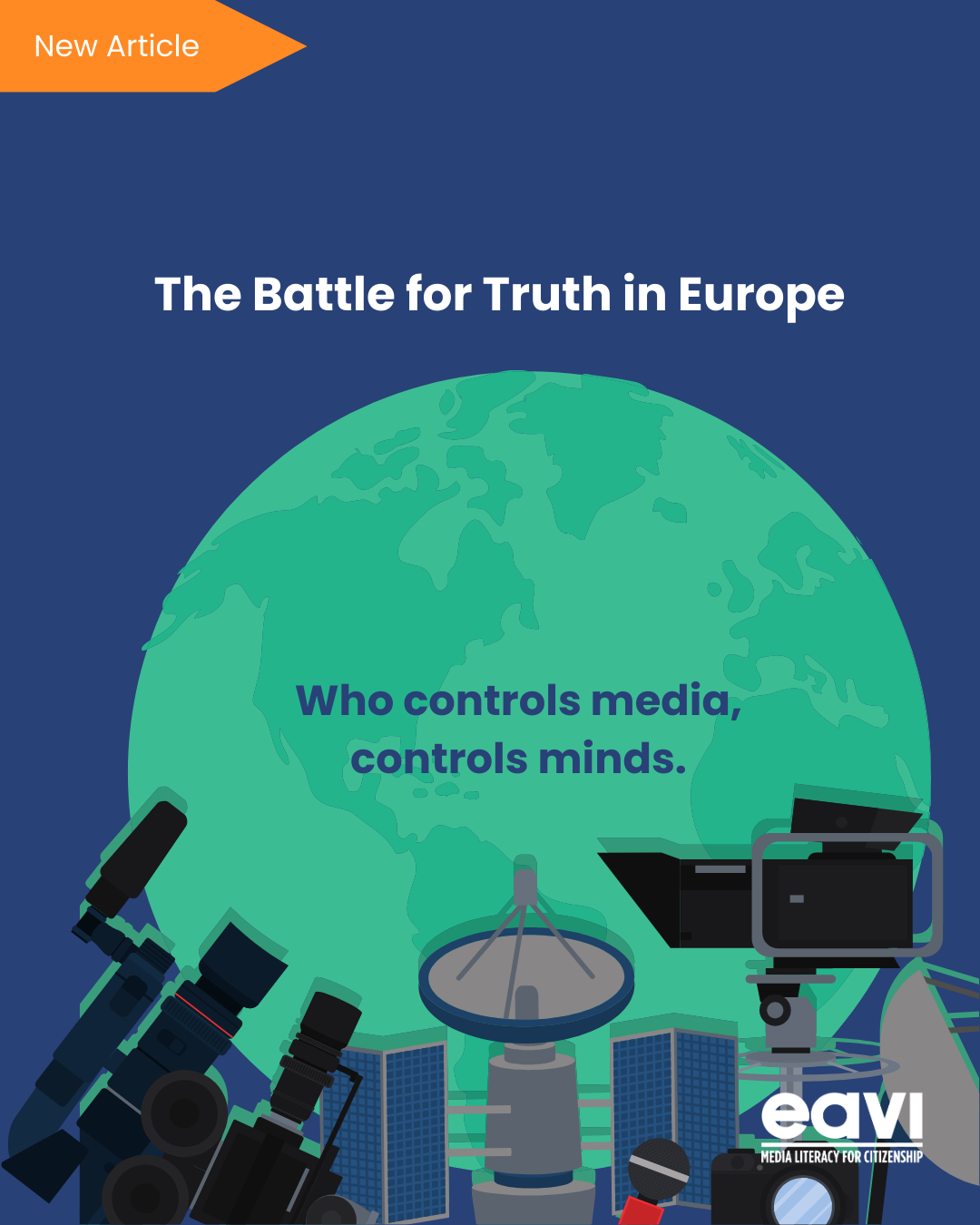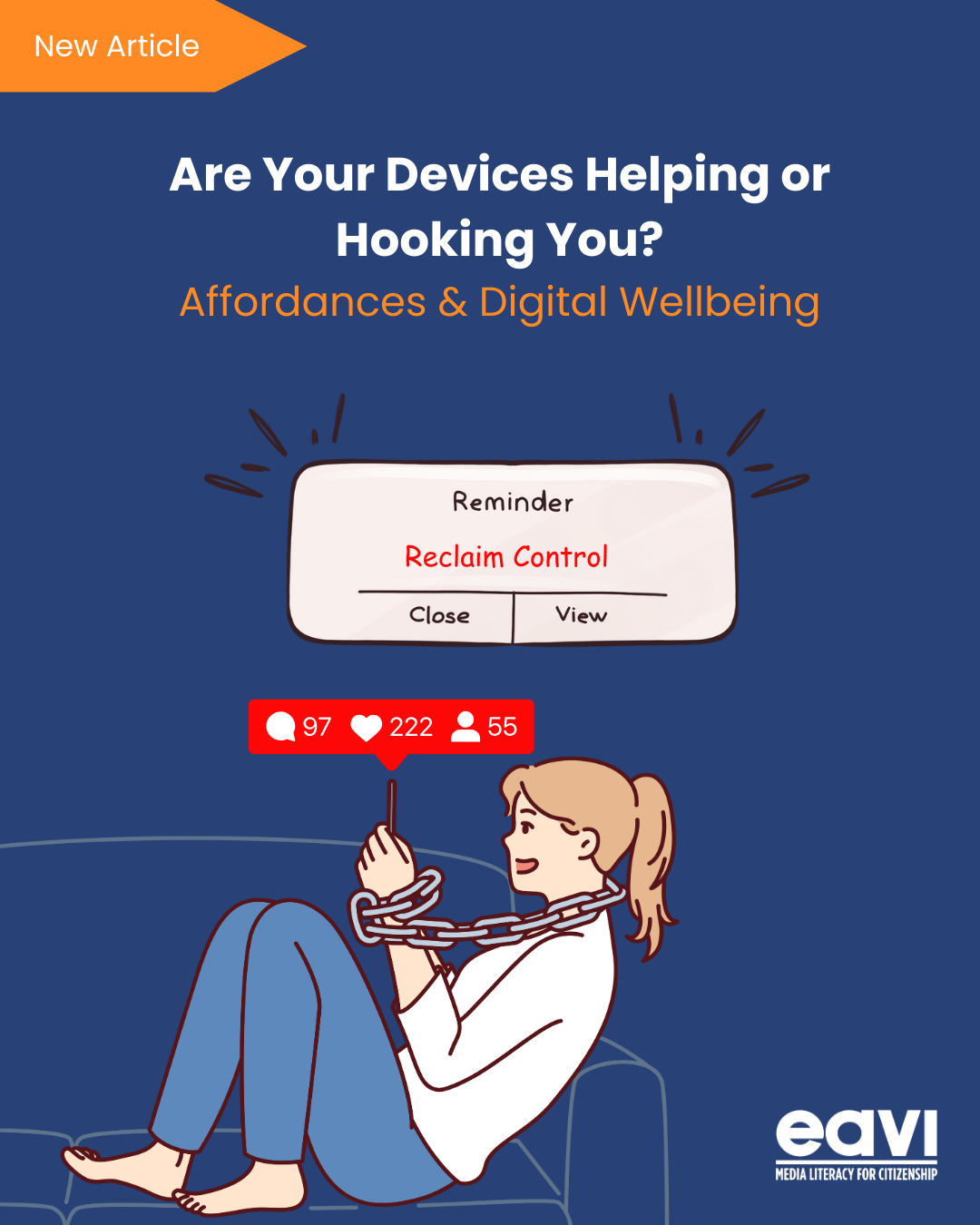
Nowadays, the media play a vital role in our everyday lives. Technological advances and progress have brought new media usage to the fore and have given a new meaning to “freedom of speech.” Through social media, everyone can express his/her opinion regarding several subjects without second thoughts. However, according to some, the new era of social media has brought some new doubts: does freedom of speech have ethical and political boundaries? How can the ability to express our opinion relate to the spread of false information that “harms” rather than inform citizens and, thus, democracies? With the broad use of social media, it is easier for everyone to express their opinions, ideas, and beliefs and sometimes influence others. However, it is an individual responsibility to respect others and not harm ourselves and broader societies. Think about Trump’s case; he kept posting false information that affected citizens and broader communities. Before the banning of his account by several social media platforms, he had 88.7M followers and had generated a high number of 59.558 Tweets. He took advantage of the fundamental human right of freedom of expression to spread disinformation and affect the political scene; his last Tweets is also considered the Capitol attack cause. Still, we need to reflect, was big tech companies’ decision right to restore peace and democracy? Or was it an infringement of freedom of speech?
What exactly is freedom of expression?
According to Article 10 of the Human Rights Act and Article 11 of the EU Charter of Fundamental Rights, “Everyone has the right to freedom of expression. This right shall include freedom to hold opinions and to receive and impart information and ideas without interference by public authority and regardless of frontiers.” Press freedom is inseparably linked with balanced and democratic societies, where citizens are free to express their opinion and receive information and respect others’ opinions.
Even though, in principle, we are free to express our opinion, is it truly the case? As one can notice, we cannot share views that are considered “offences” or “threats.” Have you ever thought about the boundary of freedom of expression and its limitations?
Despite the fact that we have the right to express ourselves freely, we also have a duty to behave responsibly and respect other people’s rights. According to the Article 10.2 of the European Convention on Human Rights, public authorities may limit this right to protect public safety, health, morals, and other people’s rights and reputations and prevent crime or disorder. Restrictions or penalties aim to restore democracy in our societies.

And press freedom?
Freedom of expression is the foundation for other rights, including the freedom of the press. But how can we say that we have a free press when we are not even sure if we are allowed to express our opinion without any restrictions? It seems that the press is at the forefront of this significant issue. Some people may think that the 21st century is the era of freedom; however, newspapers, on-line or off-line media, and most significantly, journalists are still in great danger, by following specific rules that restrict them on several levels.
Press freedom, the right to report news or circulate opinion without censorship from the government, is a fundamental human right and correlates with democracy and ” a culture of openness.” It is a part of UN Sustainable Development Goal 10, target 16.10 that “Ensures public access to information and protects fundamental freedoms, in accordance with national legislation and international agreements.” It holds a meaningful role in informing citizens about public affairs, giving them the right to express their opinion without fear of punishment, and monitoring governments’ actions at all levels. In the absence of a free press, citizens cannot be aware of the current affairs and events; therefore, they cannot truly participate in their communities by making informed decisions or contributing to balanced democracies. Despite its significance and several institutions’ efforts to ensure a free press, threats under press freedom continue to exist. So, we need to reflect, how and where does press freedom apply? Why some media can not report freely and critically, without threat or fear? Why does it differ from country to country? What can be done to ensure a free press?
Threats to press freedom
Restrictions to press freedom are not something new. An early defense of press freedom was made by the poet John Milton who responded to a British Parliament’s law where all books should get approved by the government before publication. Furthermore, one of the first court cases involving freedom of the press in America took place in 1734, where the British governor William Cosby brought a lawsuit against a New York Weekly Journal publisher, John Peter Zenger, who later was acquitted, for publishing commentary critical of Cosby’s government. Nowadays, according to the 2020 World Press Freedom Index, by the Reporters without Borders, there are significant inequalities among countries. Norway is on the top of this list, while North Korea is considered the least adequate country regarding press freedom, where citizens are in a state of “complete ignorance” about what is happening. There is thorough control over the publishing of information, and only one permitted source of news, the Korean Central News Agency (KCNA). On the same wavelength, there is no press freedom in other countries in this index’s last positions, including China, Syria, Iran, and Saudi Arabia, and as a result, they have significant deficiencies with the democratic process. On the other hand, Norway has taken the reins on democracy and freedom of expression with open access to information and the journalists’ safety, with Finland and Denmark at the second and third positions, respectively. Moreover, through particular rules, some countries are trying to prevent hate speech and disinformation while others aim to avoid the kind of speech that is considered in some contexts as the mere expression of an opinion.
Journalists find themselves at the center of this “crisis.” They put themselves at risk, and they experience great dangers. The current events depict a dark reality of journalism worldwide. For instance, journalists are being beaten in Myanmar for reporting on Military Coup, and more than 100 journalists got detained or harassed by police in Russia during February 2021. According to a global survey by UNESCO and the International Center for Journalists (ICFJ) that was run in October 2020, 73% of women journalists had experienced online violence in the course of their work. In general, around 1,000 journalists have lost their lives in the last decade, and nine in ten cases “are unresolved.” In the contexts where freedom of expression is not valued, media report on subjects in a way that relates to the ideological and political framework. According to Freedom House, the press and, therefore, the journalists, are getting affected by the head of states, violent groups, judges, media owners, security forces, and even trolls.
In these conditions, it is impossible to achieve high-quality journalism, informing citizens and raising awareness where there are threats to press freedom. Journalists experience a big dilemma: self-censor or putting their lives in danger, including lawsuits, prison sentences, and violence? Journalists and media workers should be allowed to express their opinion without any risk, to report on events that will enable an informed citizenship. Their safety should be considered a priority in our societies.
To sum up, press freedom is highly connected with the state of democracies. It constitutes a part of the fundamental right of freedom of expression. For the European Commission, “Media freedom and pluralism are pillars of modern democracy as they are essential components of open and free debate.” However, as press freedom is threatened, our democracy is threatened, too. Therefore, we should ensure the safety of journalists and other media actors. Lastly, we should all keep in mind that freedom of expression enables active participation and civic engagement by allowing us to think and debate freely and respect others at the same time.

Nowadays, the media play a vital role in our everyday lives. Technological advances and progress have brought new media usage to the fore and have given a new meaning to “freedom of speech.” Through social media, everyone can express his/her opinion regarding several subjects without second thoughts. However, according to some, the new era of social media has brought some new doubts: does freedom of speech have ethical and political boundaries? How can the ability to express our opinion relate to the spread of false information that “harms” rather than inform citizens and, thus, democracies? With the broad use of social media, it is easier for everyone to express their opinions, ideas, and beliefs and sometimes influence others. However, it is an individual responsibility to respect others and not harm ourselves and broader societies. Think about Trump’s case; he kept posting false information that affected citizens and broader communities. Before the banning of his account by several social media platforms, he had 88.7M followers and had generated a high number of 59.558 Tweets. He took advantage of the fundamental human right of freedom of expression to spread disinformation and affect the political scene; his last Tweets is also considered the Capitol attack cause. Still, we need to reflect, was big tech companies’ decision right to restore peace and democracy? Or was it an infringement of freedom of speech?
What exactly is freedom of expression?
According to Article 10 of the Human Rights Act and Article 11 of the EU Charter of Fundamental Rights, “Everyone has the right to freedom of expression. This right shall include freedom to hold opinions and to receive and impart information and ideas without interference by public authority and regardless of frontiers.” Press freedom is inseparably linked with balanced and democratic societies, where citizens are free to express their opinion and receive information and respect others’ opinions.
Even though, in principle, we are free to express our opinion, is it truly the case? As one can notice, we cannot share views that are considered “offences” or “threats.” Have you ever thought about the boundary of freedom of expression and its limitations?
Despite the fact that we have the right to express ourselves freely, we also have a duty to behave responsibly and respect other people’s rights. According to the Article 10.2 of the European Convention on Human Rights, public authorities may limit this right to protect public safety, health, morals, and other people’s rights and reputations and prevent crime or disorder. Restrictions or penalties aim to restore democracy in our societies.

And press freedom?
Freedom of expression is the foundation for other rights, including the freedom of the press. But how can we say that we have a free press when we are not even sure if we are allowed to express our opinion without any restrictions? It seems that the press is at the forefront of this significant issue. Some people may think that the 21st century is the era of freedom; however, newspapers, on-line or off-line media, and most significantly, journalists are still in great danger, by following specific rules that restrict them on several levels.
Press freedom, the right to report news or circulate opinion without censorship from the government, is a fundamental human right and correlates with democracy and ” a culture of openness.” It is a part of UN Sustainable Development Goal 10, target 16.10 that “Ensures public access to information and protects fundamental freedoms, in accordance with national legislation and international agreements.” It holds a meaningful role in informing citizens about public affairs, giving them the right to express their opinion without fear of punishment, and monitoring governments’ actions at all levels. In the absence of a free press, citizens cannot be aware of the current affairs and events; therefore, they cannot truly participate in their communities by making informed decisions or contributing to balanced democracies. Despite its significance and several institutions’ efforts to ensure a free press, threats under press freedom continue to exist. So, we need to reflect, how and where does press freedom apply? Why some media can not report freely and critically, without threat or fear? Why does it differ from country to country? What can be done to ensure a free press?
Threats to press freedom
Restrictions to press freedom are not something new. An early defense of press freedom was made by the poet John Milton who responded to a British Parliament’s law where all books should get approved by the government before publication. Furthermore, one of the first court cases involving freedom of the press in America took place in 1734, where the British governor William Cosby brought a lawsuit against a New York Weekly Journal publisher, John Peter Zenger, who later was acquitted, for publishing commentary critical of Cosby’s government. Nowadays, according to the 2020 World Press Freedom Index, by the Reporters without Borders, there are significant inequalities among countries. Norway is on the top of this list, while North Korea is considered the least adequate country regarding press freedom, where citizens are in a state of “complete ignorance” about what is happening. There is thorough control over the publishing of information, and only one permitted source of news, the Korean Central News Agency (KCNA). On the same wavelength, there is no press freedom in other countries in this index’s last positions, including China, Syria, Iran, and Saudi Arabia, and as a result, they have significant deficiencies with the democratic process. On the other hand, Norway has taken the reins on democracy and freedom of expression with open access to information and the journalists’ safety, with Finland and Denmark at the second and third positions, respectively. Moreover, through particular rules, some countries are trying to prevent hate speech and disinformation while others aim to avoid the kind of speech that is considered in some contexts as the mere expression of an opinion.
Journalists find themselves at the center of this “crisis.” They put themselves at risk, and they experience great dangers. The current events depict a dark reality of journalism worldwide. For instance, journalists are being beaten in Myanmar for reporting on Military Coup, and more than 100 journalists got detained or harassed by police in Russia during February 2021. According to a global survey by UNESCO and the International Center for Journalists (ICFJ) that was run in October 2020, 73% of women journalists had experienced online violence in the course of their work. In general, around 1,000 journalists have lost their lives in the last decade, and nine in ten cases “are unresolved.” In the contexts where freedom of expression is not valued, media report on subjects in a way that relates to the ideological and political framework. According to Freedom House, the press and, therefore, the journalists, are getting affected by the head of states, violent groups, judges, media owners, security forces, and even trolls.
In these conditions, it is impossible to achieve high-quality journalism, informing citizens and raising awareness where there are threats to press freedom. Journalists experience a big dilemma: self-censor or putting their lives in danger, including lawsuits, prison sentences, and violence? Journalists and media workers should be allowed to express their opinion without any risk, to report on events that will enable an informed citizenship. Their safety should be considered a priority in our societies.
To sum up, press freedom is highly connected with the state of democracies. It constitutes a part of the fundamental right of freedom of expression. For the European Commission, “Media freedom and pluralism are pillars of modern democracy as they are essential components of open and free debate.” However, as press freedom is threatened, our democracy is threatened, too. Therefore, we should ensure the safety of journalists and other media actors. Lastly, we should all keep in mind that freedom of expression enables active participation and civic engagement by allowing us to think and debate freely and respect others at the same time.

Nowadays, the media play a vital role in our everyday lives. Technological advances and progress have brought new media usage to the fore and have given a new meaning to “freedom of speech.” Through social media, everyone can express his/her opinion regarding several subjects without second thoughts. However, according to some, the new era of social media has brought some new doubts: does freedom of speech have ethical and political boundaries? How can the ability to express our opinion relate to the spread of false information that “harms” rather than inform citizens and, thus, democracies? With the broad use of social media, it is easier for everyone to express their opinions, ideas, and beliefs and sometimes influence others. However, it is an individual responsibility to respect others and not harm ourselves and broader societies. Think about Trump’s case; he kept posting false information that affected citizens and broader communities. Before the banning of his account by several social media platforms, he had 88.7M followers and had generated a high number of 59.558 Tweets. He took advantage of the fundamental human right of freedom of expression to spread disinformation and affect the political scene; his last Tweets is also considered the Capitol attack cause. Still, we need to reflect, was big tech companies’ decision right to restore peace and democracy? Or was it an infringement of freedom of speech?
What exactly is freedom of expression?
According to Article 10 of the Human Rights Act and Article 11 of the EU Charter of Fundamental Rights, “Everyone has the right to freedom of expression. This right shall include freedom to hold opinions and to receive and impart information and ideas without interference by public authority and regardless of frontiers.” Press freedom is inseparably linked with balanced and democratic societies, where citizens are free to express their opinion and receive information and respect others’ opinions.
Even though, in principle, we are free to express our opinion, is it truly the case? As one can notice, we cannot share views that are considered “offences” or “threats.” Have you ever thought about the boundary of freedom of expression and its limitations?
Despite the fact that we have the right to express ourselves freely, we also have a duty to behave responsibly and respect other people’s rights. According to the Article 10.2 of the European Convention on Human Rights, public authorities may limit this right to protect public safety, health, morals, and other people’s rights and reputations and prevent crime or disorder. Restrictions or penalties aim to restore democracy in our societies.

And press freedom?
Freedom of expression is the foundation for other rights, including the freedom of the press. But how can we say that we have a free press when we are not even sure if we are allowed to express our opinion without any restrictions? It seems that the press is at the forefront of this significant issue. Some people may think that the 21st century is the era of freedom; however, newspapers, on-line or off-line media, and most significantly, journalists are still in great danger, by following specific rules that restrict them on several levels.
Press freedom, the right to report news or circulate opinion without censorship from the government, is a fundamental human right and correlates with democracy and ” a culture of openness.” It is a part of UN Sustainable Development Goal 10, target 16.10 that “Ensures public access to information and protects fundamental freedoms, in accordance with national legislation and international agreements.” It holds a meaningful role in informing citizens about public affairs, giving them the right to express their opinion without fear of punishment, and monitoring governments’ actions at all levels. In the absence of a free press, citizens cannot be aware of the current affairs and events; therefore, they cannot truly participate in their communities by making informed decisions or contributing to balanced democracies. Despite its significance and several institutions’ efforts to ensure a free press, threats under press freedom continue to exist. So, we need to reflect, how and where does press freedom apply? Why some media can not report freely and critically, without threat or fear? Why does it differ from country to country? What can be done to ensure a free press?
Threats to press freedom
Restrictions to press freedom are not something new. An early defense of press freedom was made by the poet John Milton who responded to a British Parliament’s law where all books should get approved by the government before publication. Furthermore, one of the first court cases involving freedom of the press in America took place in 1734, where the British governor William Cosby brought a lawsuit against a New York Weekly Journal publisher, John Peter Zenger, who later was acquitted, for publishing commentary critical of Cosby’s government. Nowadays, according to the 2020 World Press Freedom Index, by the Reporters without Borders, there are significant inequalities among countries. Norway is on the top of this list, while North Korea is considered the least adequate country regarding press freedom, where citizens are in a state of “complete ignorance” about what is happening. There is thorough control over the publishing of information, and only one permitted source of news, the Korean Central News Agency (KCNA). On the same wavelength, there is no press freedom in other countries in this index’s last positions, including China, Syria, Iran, and Saudi Arabia, and as a result, they have significant deficiencies with the democratic process. On the other hand, Norway has taken the reins on democracy and freedom of expression with open access to information and the journalists’ safety, with Finland and Denmark at the second and third positions, respectively. Moreover, through particular rules, some countries are trying to prevent hate speech and disinformation while others aim to avoid the kind of speech that is considered in some contexts as the mere expression of an opinion.
Journalists find themselves at the center of this “crisis.” They put themselves at risk, and they experience great dangers. The current events depict a dark reality of journalism worldwide. For instance, journalists are being beaten in Myanmar for reporting on Military Coup, and more than 100 journalists got detained or harassed by police in Russia during February 2021. According to a global survey by UNESCO and the International Center for Journalists (ICFJ) that was run in October 2020, 73% of women journalists had experienced online violence in the course of their work. In general, around 1,000 journalists have lost their lives in the last decade, and nine in ten cases “are unresolved.” In the contexts where freedom of expression is not valued, media report on subjects in a way that relates to the ideological and political framework. According to Freedom House, the press and, therefore, the journalists, are getting affected by the head of states, violent groups, judges, media owners, security forces, and even trolls.
In these conditions, it is impossible to achieve high-quality journalism, informing citizens and raising awareness where there are threats to press freedom. Journalists experience a big dilemma: self-censor or putting their lives in danger, including lawsuits, prison sentences, and violence? Journalists and media workers should be allowed to express their opinion without any risk, to report on events that will enable an informed citizenship. Their safety should be considered a priority in our societies.
To sum up, press freedom is highly connected with the state of democracies. It constitutes a part of the fundamental right of freedom of expression. For the European Commission, “Media freedom and pluralism are pillars of modern democracy as they are essential components of open and free debate.” However, as press freedom is threatened, our democracy is threatened, too. Therefore, we should ensure the safety of journalists and other media actors. Lastly, we should all keep in mind that freedom of expression enables active participation and civic engagement by allowing us to think and debate freely and respect others at the same time.








































































































































































